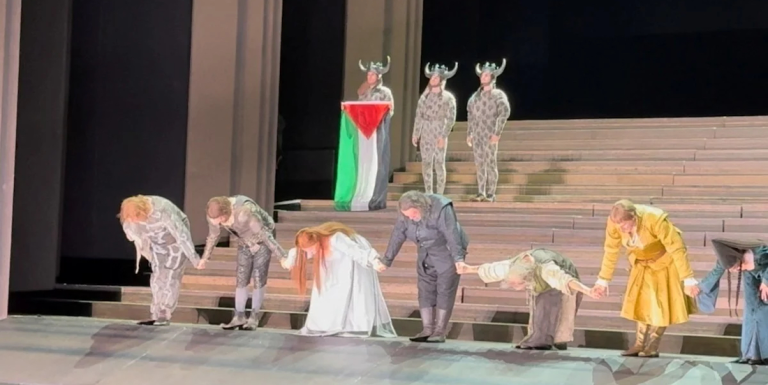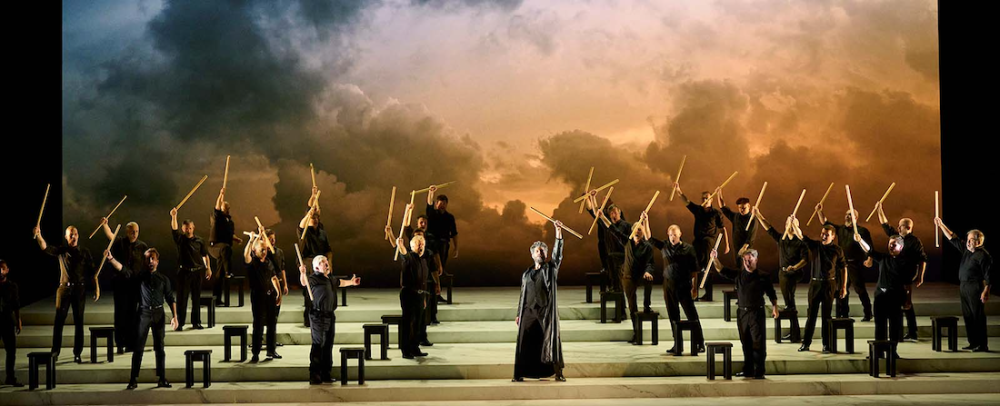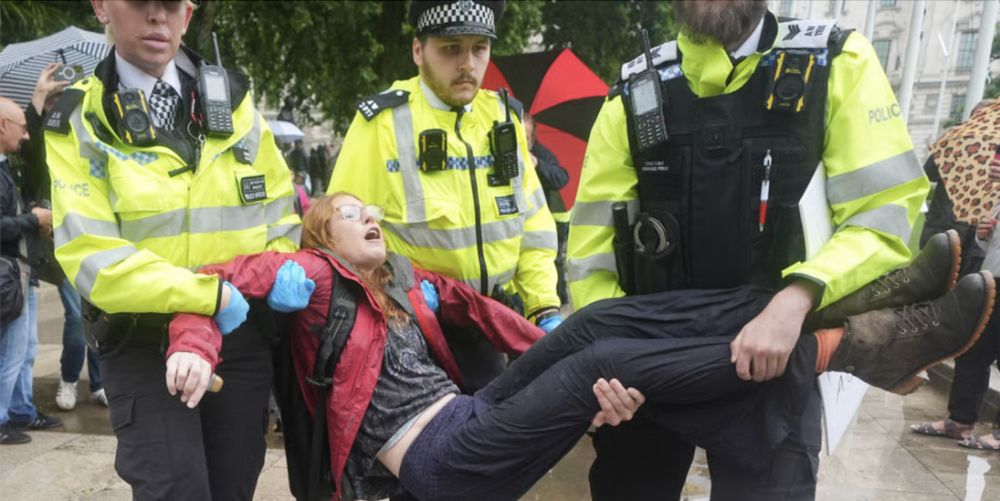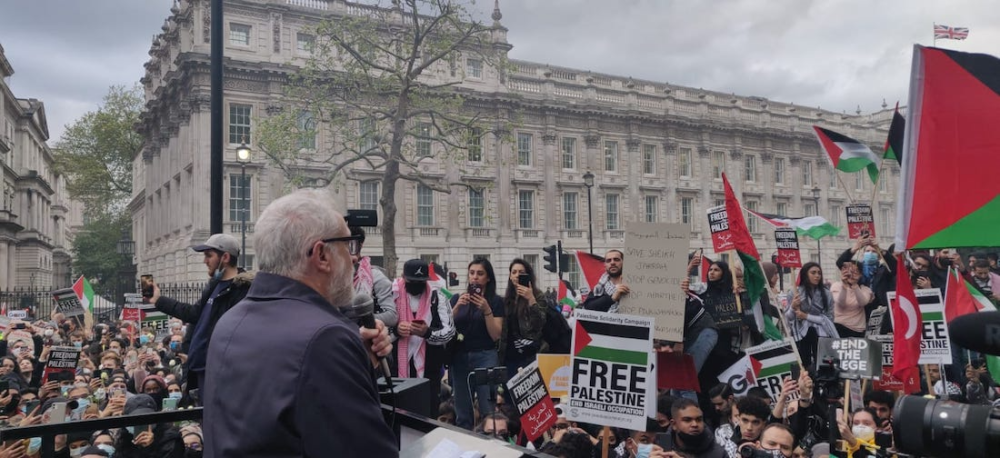
Unauthorized political demonstration disrupts curtain call at London’s prestigious venue during Il Trovatore finale
New York, N.Y. – A dramatic moment unfolded at London’s Royal Opera House on Saturday night when a chorus member displayed a Palestinian flag during the curtain call of the season’s final performance of Giuseppe Verdi‘s “Il Trovatore,” sparking an immediate backstage confrontation and raising questions about political expression in classical music venues.

Confrontation Captured on Social Media
Social media footage reveals the tense moment as the performer, identified as a chorus member, unfurled the flag across their chest while lead singers acknowledged the audience’s applause. The display lasted several moments before someone from backstage attempted to confiscate the flag, resulting in a brief physical struggle as the performer resisted and maintained their grip on the symbolic banner.
The incident occurred during what should have been a triumphant conclusion to the opera season, with the prestigious venue hosting one of Verdi’s most celebrated works. The timing of the demonstration—during the curtain call when performers traditionally receive audience appreciation—amplified its visibility and impact.
Royal Ballet and Opera officials responded swiftly to the controversy, issuing a statement on Sunday that unequivocally condemned the action. “The display of the flag was an unauthorized action by the artist,” the company declared. “It was not approved by the Royal Ballet and Opera and is a wholly inappropriate act.”

Political Expression in Cultural Venues
The incident highlights ongoing tensions regarding political expression within cultural institutions, particularly as the Israeli-Palestinian conflict continues to influence discourse across various sectors of society. Opera houses and theaters worldwide have grappled with balancing artistic freedom, political neutrality, and institutional policies regarding unauthorized demonstrations.
Classical music venues traditionally maintain strict protocols regarding unscripted actions during performances, especially those of a political nature. The Royal Opera House, as one of the world’s most prestigious operatic institutions, operates under guidelines that typically prohibit unauthorized political displays that could disrupt performances or alienate audiences.
Industry experts note that such incidents reflect broader debates about the role of artists as political actors and the appropriate venues for expressing political viewpoints. The intersection of art and politics has become increasingly complex, with performers facing pressure to address global conflicts while institutions seek to maintain neutrality.

Institutional Response and Disciplinary Questions
When contacted for additional comment, Royal Opera House representatives declined to specify whether disciplinary measures would be implemented against the performer involved. This silence has generated speculation about potential consequences, ranging from reprimands to suspension or termination, depending on the severity the institution assigns to the breach of protocol.
The company’s measured response suggests careful consideration of various factors, including contractual obligations, union protections, public relations implications, and precedent-setting concerns. Opera companies typically maintain detailed codes of conduct that address on-stage behavior, though political demonstrations during curtain calls represent relatively unprecedented territory.
Legal experts suggest that disciplinary actions could depend on specific contractual language regarding unauthorized actions, the performer’s employment status, and potential union involvement. The United Kingdom’s employment laws provide certain protections for workers, though these may not extend to actions deemed contrary to workplace policies or professional conduct standards.

Audience and Industry Reactions
Initial audience reactions, as captured in social media posts, appeared mixed, with some attendees expressing surprise while others documented the incident through photographs and videos. The diverse response reflects broader public opinion divisions regarding the Middle East conflict and appropriate venues for political expression.
Opera industry professionals have begun discussing the incident’s implications for future performances and institutional policies. Some argue that artistic venues should remain politically neutral spaces, while others contend that artists have fundamental rights to express political viewpoints, even within traditional cultural settings.
The timing of the demonstration, occurring during “Il Trovatore’s” final performance of the season, adds another layer of complexity to the situation. Verdi’s opera, with themes of political conflict and personal sacrifice, may have provided an ironic backdrop for the real-world political demonstration that unfolded during its conclusion.

Broader Cultural Implications
This incident represents part of a broader pattern of political expression within cultural institutions across Europe and beyond. Museums, theaters, and concert halls have increasingly become sites of political demonstration as artists and audiences seek to address contemporary global issues through cultural platforms.
The Royal Opera House incident may influence how other cultural institutions approach policies regarding unauthorized political expressions. Industry organizations are likely to examine existing guidelines and consider whether additional measures are necessary to prevent similar disruptions while respecting artistic freedom and expression rights.
Arts administration professionals emphasize the delicate balance required between maintaining institutional neutrality and acknowledging the political consciousness that often drives artistic expression. The incident underscores ongoing challenges facing cultural institutions in an increasingly polarized global environment.
As the opera world processes this unprecedented moment, questions remain about the performer’s motivations, the institution’s ultimate response, and the broader implications for political expression within classical music venues. The incident serves as a catalyst for important conversations about the intersection of art, politics, and institutional responsibility in contemporary cultural spaces.

Summary
A performer at London’s Royal Opera House created controversy by displaying a Palestinian flag during the final bow of Il Trovatore on Saturday night. The opera company condemned the unauthorized political demonstration, calling it wholly inappropriate. The incident, captured on social media, shows someone attempting to remove the flag while the performer resisted. The Royal Opera House has not disclosed whether disciplinary action will be taken against the chorus member involved.
#RoyalOperaHouse #OperaControversy #PoliticalExpression #ClassicalMusic #LondonOpera #CulturalInstitutions #ArtisticFreedom #OperaSeason #IlTrovatore #TheaterNews
TAGS: Royal Opera House, Palestinian flag, political demonstration, classical music, cultural institutions,
artistic expression, London theater, opera controversy, curtain call incident, institutional policies
